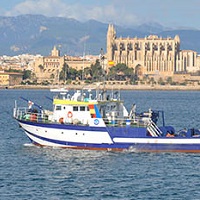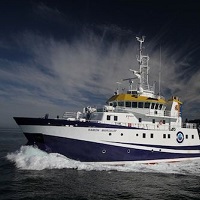Keyword
Light extinction and diffusion coefficients
94 record(s)
Type of resources
Categories
Topics
INSPIRE themes
Keywords
Contact for the resource
Provided by
Years
Formats
Status
-

EVALUACION DE LA SENSIBILIDAD DEL BUCLE MICROBIANO AL IMPACTO DE MULTIPLES FACTORES EN ECOSISTEMAS ACUATICOS MEDITERRANEOS OBJETIVOS: De acuerdo con los planteados en el proyecto Microsens, los objetivos de la campaña serán los siguientes: 1. Cuantificar la biodiversidad de la comunidad planctónica, mediante la determinación de: 1.1 La abundancia y biomasa de bacterias y picoplancton autótrofo 1.2. La composición taxonómica, abundancia y biomasa de fitoplancton 1.3. La composición taxonómica, abundancia y biomasa de nanoflagelados y ciliados. 1.4. La composición taxonómica, abundancia y biomasa de micro y macrozooplancton. 2. Cuantificar el flujo de carbono entre los distintos grupos funcionales que constituyen el bucle microbiano y la cadena de consumidores, para lo cual se llevarán a cabo medidas de la producción primaria y respiración en diferentes fracciones del plancton 3. Determinar las respuestas funcionales y metabólicas de la comunidad planctónica ante cambios en el espectro de radiación solar y en la concentración de nutrientes mediante experimentos de micro-cosmos realizados a bordo.
-

The objective of the project RADIALES, formulated in 1990, aims at “understanding and modelling the response of the marine ecosystem to the sources of temporal variability in oceanographic and planktonic components, particularly foccusing in those factors and processes affecting biological production and potentially altering the ecosystem services”. This project represents the oldest multidisciplinary ocean observation initiative still active in Spain.
-

The objective of the project RADIALES, formulated in 1990, aims at “understanding and modelling the response of the marine ecosystem to the sources of temporal variability in oceanographic and planktonic components, particularly foccusing in those factors and processes affecting biological production and potentially altering the ecosystem services”. This project represents the oldest multidisciplinary ocean observation initiative still active in Spain.
-

The objective of the project RADIALES, formulated in 1990, aims at “understanding and modelling the response of the marine ecosystem to the sources of temporal variability in oceanographic and planktonic components, particularly foccusing in those factors and processes affecting biological production and potentially altering the ecosystem services”. This project represents the oldest multidisciplinary ocean observation initiative still active in Spain.
-

The objective of the project RADIALES, formulated in 1990, aims at “understanding and modelling the response of the marine ecosystem to the sources of temporal variability in oceanographic and planktonic components, particularly foccusing in those factors and processes affecting biological production and potentially altering the ecosystem services”. This project represents the oldest multidisciplinary ocean observation initiative still active in Spain.
-

The objective of the project RADIALES, formulated in 1990, aims at “understanding and modelling the response of the marine ecosystem to the sources of temporal variability in oceanographic and planktonic components, particularly foccusing in those factors and processes affecting biological production and potentially altering the ecosystem services”. This project represents the oldest multidisciplinary ocean observation initiative still active in Spain.
-

The objective of the project RADIALES, formulated in 1990, aims at “understanding and modelling the response of the marine ecosystem to the sources of temporal variability in oceanographic and planktonic components, particularly foccusing in those factors and processes affecting biological production and potentially altering the ecosystem services”. This project represents the oldest multidisciplinary ocean observation initiative still active in Spain.
-

The objective of the project RADIALES, formulated in 1990, aims at “understanding and modelling the response of the marine ecosystem to the sources of temporal variability in oceanographic and planktonic components, particularly foccusing in those factors and processes affecting biological production and potentially altering the ecosystem services”. This project represents the oldest multidisciplinary ocean observation initiative still active in Spain.
-

The objective of the project RADIALES, formulated in 1990, aims at “understanding and modelling the response of the marine ecosystem to the sources of temporal variability in oceanographic and planktonic components, particularly foccusing in those factors and processes affecting biological production and potentially altering the ecosystem services”. This project represents the oldest multidisciplinary ocean observation initiative still active in Spain.
-

The objective of the project RADIALES, formulated in 1990, aims at “understanding and modelling the response of the marine ecosystem to the sources of temporal variability in oceanographic and planktonic components, particularly foccusing in those factors and processes affecting biological production and potentially altering the ecosystem services”. This project represents the oldest multidisciplinary ocean observation initiative still active in Spain.
 Catálogo de datos del IEO
Catálogo de datos del IEO